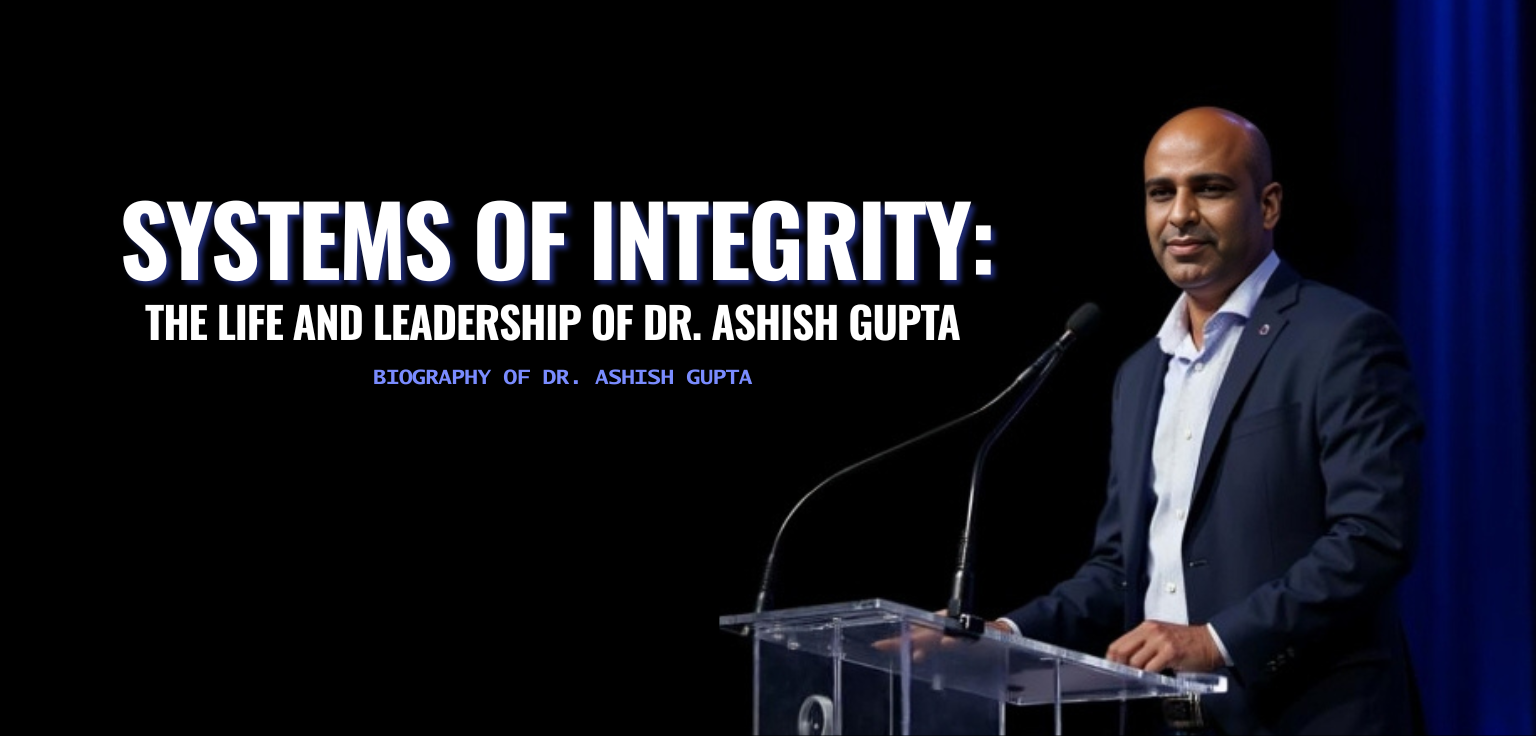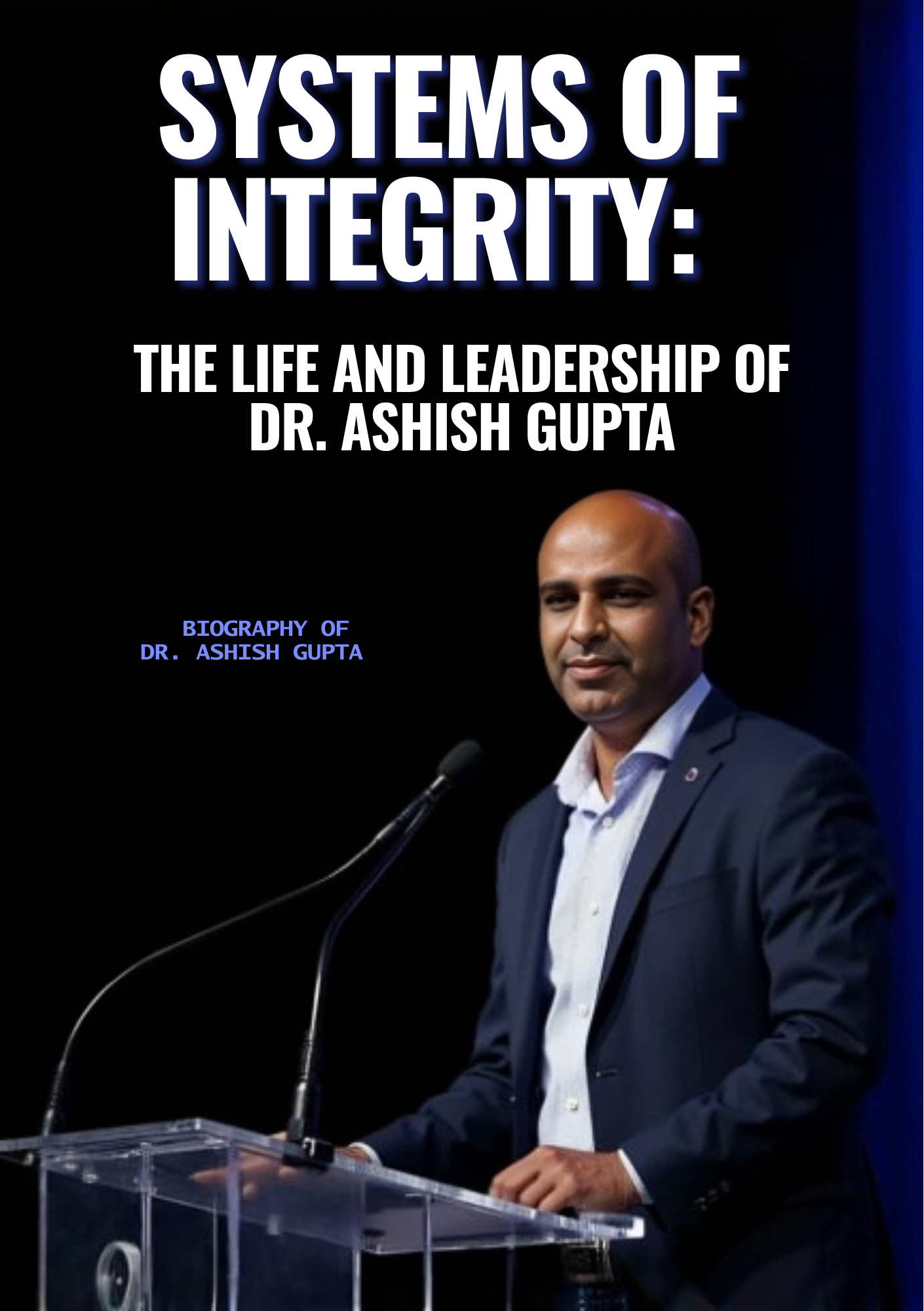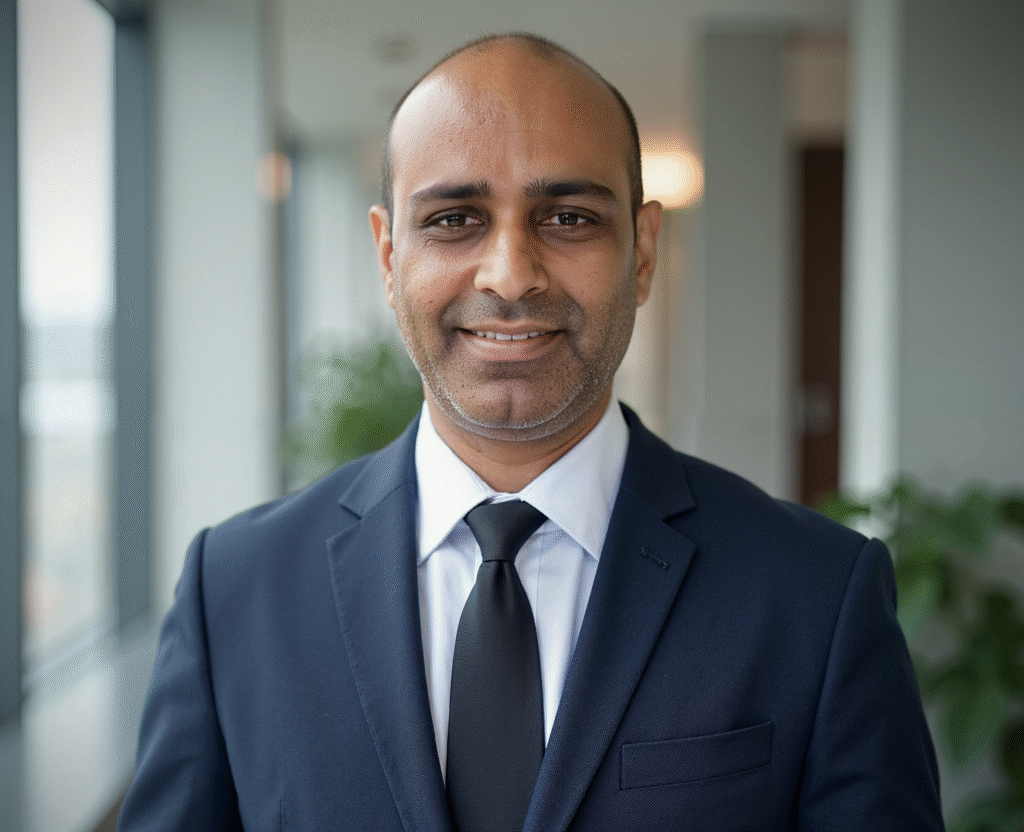

“To those who shaped the roots, lit the path, and stood silently behind every breakthrough—this journey is theirs as much as it is his.”
Dedication
This biography is dedicated, first and foremost, to the quiet pillars behind Dr. Ashish Gupta’s success—his parents and grandfather—whose values have stood taller than any professional milestone, and whose unwavering belief carried him through every uncertain crossroad.
In a world where many are pushed toward predetermined paths, Dr. Ashish was offered freedom, not force—support, not scrutiny. This rare privilege became the soil in which his curiosity, resilience, and eventual excellence took root. His father, a man of gentle yet resolute strength, was not only his cheerleader during his cricketing years but also his quiet partner during the darkest moments of redirection. He didn’t just drive him to matches—he drove belief into his heart, reminding him that talent must be matched with tenacity, but never at the cost of one’s peace.
When Dr. Ashish made the painful decision to walk away from a promising career in sports—a decision born not from weakness, but from wisdom—his father’s heartbreak was visible. And yet, never once did that heartbreak translate into blame. Instead, it transformed into a deeper respect, a bond rooted in mutual understanding and trust.
To his mother, who created the emotional and moral compass of the household, this biography is a gesture of gratitude for every silent sacrifice. In times when society often expected women to stay in the background, she stood beside her children as an emotional anchor. Her compassion, discipline, and ability to make the ordinary seem extraordinary influenced Dr. Ashish far more than any classroom could. Her nurturing spirit ensured that even in chaos, home remained his sanctuary, and that no failure outside could ever shake the foundation she built within.
But at the spiritual center of his early life was his grandfather—a man of intellect and deep life experience who survived the upheaval of India’s Partition and lived to tell its lessons with patience and perspective. To him, this biography is a living continuation of the stories, values, and wisdom he passed on to his grandson. A graduate in the era when education was a luxury, MA-ML qualified and deeply principled, his grandfather didn’t just teach Dr. Ashish how to succeed—he taught him how to remain grounded when success comes.
From that dignified elder came the lifelong belief that “everybody has the same 24 hours—it’s how you use them that defines your destiny.” Those words became more than advice; they became architecture—blueprints for how Dr. Ashish would later structure his time, lead teams, and manage multi-million-dollar programs with fierce discipline and calm focus.
This dedication would be incomplete without acknowledging the mentors who shaped his professional vision—most notably Mr. Ashwin Kurana, whose guidance at a crucial point in Dr. Ashish’s career turned him from a hesitant communicator into a confident leader. Mr. Kurana didn’t just correct emails—he corrected mindsets. He didn’t just teach corporate etiquette—he instilled executive composure. His wisdom around conflict resolution, email communication, and navigating internal pressures provided Dr. Ashish with tools he uses to this day at the highest levels of IBM.
To every early colleague, manager, and even those who wronged or doubted him—this story is, in a strange but important way, dedicated to them too. The lessons learned through betrayal, delay, and workplace politics became quiet blessings, shaping his understanding of assessment over assumption, character over cleverness, and principles over politics. These were not just professional revelations—they were human ones.
To his wife and children, this journey is both a reflection and a promise. A reflection of what he has become because of the time, space, and emotional bandwidth they have provided. And a promise that no title, no accolade, and no client presentation will ever be more important than the peace and joy of shared family time. Dr. Ashish has often said that true success is the ability to sleep peacefully and enjoy moments with loved ones—their love makes that success possible.
Lastly, this biography is a humble dedication to every young professional, every student, every dreamer who feels unseen or unheard in the crowd. This story is for the coder working silently at midnight, the analyst who questions their relevance in meetings, the leader who doubts their readiness, the sportsperson who had to pivot their dream, and the self-taught technologist who feels out of place among engineering pedigrees. Dr. Ashish’s journey is a testament that with enough commitment, continuous learning, and clear values—anyone can rise.
This book stands not just as a tribute to one man’s path, but as a mirror to anyone who has walked a lonely road, believed when others doubted, and chosen the hard way when the shortcuts looked easier.
So to all those who believed, who challenged, who inspired, and even those who unintentionally shaped him through adversity—this biography is dedicated to you.
Phase 1: The Seedbed of Strength
“What you grow in silence, one day speaks louder than any title”

Before there were data centers, deadlines, and decisions that influenced millions, there was a boy in Amritsar, running between cricket fields, school corridors, and the warm echoes of a joint family home. Dr. Ashish Gupta’s earliest chapter is not one of coding or corporate dreams, but of character formation—shaped in the quiet resilience of small-town India, where relationships ran deep, and values were passed down like family heirlooms.
He was raised in a home where discipline wasn’t demanded—it was demonstrated. His father, a gentle yet quietly determined figure, didn’t need to raise his voice to lead. He led by showing up. Whether it was driving young Ashish to cricket tournaments or offering silent encouragement during moments of self-doubt, his presence never wavered. That steadfast emotional availability became the model for how Ashish would later lead his own teams—not with noise, but with presence and consistency.
But it was his grandfather who played the most profound role in his early development.
A man who had witnessed the tremors of Partition and the slow rebuilding of a nation, he carried both wisdom and wounds from a different era. He was highly educated—MA, ML qualified at a time when degrees were rare and revered—and he instilled in Ashish a reverence for discipline, clarity, and self-made dignity. His words were never complicated, but always deeply resonant. One of his favorite teachings, “If you do not follow the structure of time, time will structure your downfall,” became a guiding principle for Ashish throughout his life.
As a child, Dr. Ashish was intensely extroverted, a vibrant soul always immersed in play, friendships, and spirited debates. His first love was not science or mathematics—it was cricket. Not as a weekend pastime, but as a serious, state-level pursuit. His passion was so intense that academics, for a significant period, took a backseat. The cricket field was where he learned his first lessons in teamwork, performance under pressure, and discipline in chaos. He wasn’t just playing a sport—he was rehearsing for life.
This early phase of his life was filled with the kind of freedom that builds inner conviction. His parents, unlike many of their generation, never imposed rigid academic expectations. When he chose to pursue cricket seriously, they supported him fully. When he later decided to leave the sport behind, they did not scold—they stood silently by, trusting his judgment, even when it broke their hearts. It was a defining moment: to have support without pressure is rare; to have trust during uncertainty is transformative.
But like all young dreams, his cricketing path faced hard truths. The systemic inefficiencies, favoritism, and politics of Indian sports slowly eroded the clarity he once held. Despite being one of the most deserving players, he was repeatedly overlooked. Eventually, Ashish made a decision that many would struggle to face even in adulthood—he let go. Not because he lacked the talent, but because he chose self-respect over silent suffering.
The transition away from cricket wasn’t easy. For someone whose identity was so deeply intertwined with performance and sport, the sudden vacuum brought a period of intense introspection. But that void eventually made space for curiosity—a curiosity about technology. It didn’t arrive as a grand revelation. It started with two computers in his room, networking experiments with a friend, and the quiet thrill of writing his first lines of code in C language.
Still living in his hometown, far from Delhi’s IT corridors, Dr. Ashish began his slow, self-driven pivot toward technology. What he lacked in formal training, he made up for in persistence. He wasn’t chasing certificates; he was building confidence, one program at a time, one failed compile at a time. It wasn’t long before he stumbled upon Java, a language that would define his early career path. He dove deep—not just into syntax, but into systems thinking, understanding the logic behind every line.
But these formative years were not just about professional exploration—they were about shaping a mindset. The shift from cricket to computers marked a deeper evolution: from external validation to internal direction. It was no longer about applause or titles. It became about building, learning, and executing with clarity.
Even as he transitioned academically into a Bachelor of Science program at DAV College, Ashish retained his groundedness. He wasn’t the top scorer, but he was the most inquisitive, consistent, and focused. While others aimed for grades, he pursued understanding. Professors noticed this. Friends leaned on it. And quietly, without ever announcing it, he began to stand apart.
Today, when Dr. Ashish looks back at those years, he doesn’t see missed opportunities. He sees necessary redirections. He sees how every struggle planted a seed, every silence shaped his thought, and every decision—even the painful ones—built his character.
“You can’t architect enterprise systems until you’ve architected your own values,” he often says. And in his case, those values were constructed right here—in the compact simplicity of Amritsar, in the steady love of his parents, in the gentle discipline of his grandfather, and in the dreams that changed form but never lost purpose.
Phase 2: When Dreams Change Direction
“Discipline isn’t a routine—it’s the architecture of belief."

There comes a moment in every life when we must choose—not between right and wrong—but between what’s familiar and what’s necessary. For Dr. Ashish Gupta, that moment arrived when he looked directly at the dream that had defined his youth—cricket—and made the heart-wrenching decision to let it go.
The decision wasn’t impulsive. It wasn’t born of failure or fatigue. It came from something much rarer: clarity.
By his mid-teens, Ashish had already made a name for himself in the regional cricket circuit. Representing his state, he spent years refining his game, chasing tournaments, and dedicating himself with the same discipline he would later bring to technology. Cricket wasn’t just a passion—it was his identity. Every day revolved around practice, performance, and the pursuit of perfection on the pitch. His father, ever-supportive, accompanied him to matches, invested in his gear, and believed in his son’s potential without hesitation.
But behind the applause and aspirations, a quieter truth began to settle in. The path forward wasn’t just uncertain—it was unfair. Politics, favoritism, and systemic opacity in the cricketing world slowly wore down his enthusiasm. He began noticing patterns: deserving players overlooked, selection processes tainted by bias, and the increasing realization that talent alone wasn’t enough. And as he matured, he came to an inflection point—a point where continuing would require not just effort, but self-compromise.
“I didn’t quit because I was weak. I walked away because the system didn’t align with my values,” – Ashish Gupta
With that one decision, he did something most would find terrifying—he let go of the dream he once loved.
The aftermath wasn’t easy. Overnight, he found himself adrift—no longer an athlete, not yet a professional, and surrounded by silence where there was once celebration. The world outside didn’t notice this quiet crisis, but inside his room, he wrestled with identity, purpose, and possibility. It was in those long hours of solitude that the seeds of his second act were planted.
What emerged from that void wasn’t another neatly planned career—it was curiosity. A chance encounter with computing—two PCs set up in his room, guided by a tech-savvy friend—ignited a spark. Initially, it was just play: setting up small networks, experimenting with configurations, navigating the basics of software. But as he dug deeper, something clicked. The logical flow of programming gave him the structure that cricket had once provided. The sense of building, testing, correcting—it mirrored the training discipline he had grown up with. He had discovered a new field to master.
Despite having no formal training in engineering, Ashish immersed himself in the world of programming with relentless focus. C, C++, Java—each language became a new challenge to conquer, and he taught himself through books, borrowed notes, and sheer trial and error. His transition into technology was not paved by academic degrees or elite institutions. It was carved through personal grit, shaped in PG rooms and internet cafes, fueled by a belief that skill and sincerity could outpace pedigree.
By the time he completed his Bachelor of Science degree from DAV College, he had already laid the groundwork for his future in tech. Though the degree wasn’t in engineering, his technical foundation was becoming solid. His professors noticed his drive, and while his grades may not have set records, his hunger to understand systems made him stand out. Unlike many, he wasn’t just studying to pass—he was studying to build.
In 2003, armed with a Java certification and a fire to prove himself, Ashish moved to Delhi for his first job. It wasn’t glamorous. He began as a desktop engineer, visiting clients, fixing hardware, and configuring networks. But even while working these ground-level jobs, he never let go of coding. After work, in the corners of his modest PG accommodation, he would stay up learning, debugging, and dreaming bigger.
This phase of his life—between cricket and career—taught him a foundational truth: dreams don’t die, they evolve. The same discipline he once gave to mastering the forward defense shot, he now applied to mastering enterprise architecture. The same commitment that saw him through tournaments now carried him through technical challenges. He hadn’t lost his passion—he had redirected it.
What also began to take root during this time was a deep emotional intelligence. He had experienced first-hand what it felt like to be overlooked despite ability, to be underestimated because of background. And so, when his own rise began in the professional world, he never forgot that feeling. It would later shape him into a leader who recognized silent potential, who gave chances to those who reminded him of himself, and who believed that skills can be nurtured, if only someone’s willing to see them.
As the world saw a young man switching fields, what was really happening was something deeper. Dr. Ashish Gupta was learning to architect his own journey—brick by brick, choice by choice.
Looking back, this phase remains one of the most emotionally intense transitions of his life. It tested his self-worth, his courage, and his adaptability. And yet, it also became the foundation for everything that followed. His career, his resilience, his philosophy of leadership—it all began here.
Because sometimes, the moment you let go of a dream is the moment you find your destiny.
Phase 3: Wiring the Willpower
“Discipline isn’t a routine—it’s the architecture of belief.”

The world rarely celebrates the beginning. It overlooks the small rooms, the borrowed books, the quiet hunger that builds before the first breakthrough. For Dr. Ashish Gupta, those beginnings weren’t glamorous—but they were honest. And it was during these early years, without any spotlight or security, that he did something extraordinary: he trained his will to outlast his circumstances.
After arriving in Delhi in 2003, with little more than a Java certification and unwavering determination, Ashish found himself in unfamiliar territory. The big city was overwhelming—the noise, the competition, the indifference. No one was interested in where he came from. What mattered was what he could deliver.
He began his career at the very base of the IT industry—as a desktop support engineer in a small South Delhi firm. His days were spent travelling from one office to another, fixing hardware issues, configuring networks, setting up routers, and solving problems that many considered mundane.
It wasn’t the work he envisioned when he started learning code, but he didn’t flinch. In fact, he saw it as his apprenticeship—a real-world lab where he learned problem-solving under pressure, time management in chaos, and technical grit beyond textbooks.
But what truly separated him from others was what he did after-hours. While many of his peers unwound from the day, Ashish spent his evenings in a tiny PG room, staring at his computer screen, immersed in C++ programming, Java frameworks, or backend logic diagrams. He wasn’t chasing a job title—he was crafting a foundation. A foundation not made of certifications, but of competence.
During these years, he faced not only professional friction but emotional fatigue. The world didn’t reward patience, and the industry favored degrees he didn’t have. His B.Sc. background in Computer Science, while respectable, was often dismissed in favor of B.Tech or M.Tech credentials. Many job interviews ended in rejection not because of his capability, but because of the paper barrier he couldn’t immediately break through. But Ashish never internalized the rejection. Instead, it fueled his resolve.
What made things harder was that there were no shortcuts—no family connections, no elite alumni networks. Just him, his learning, and his laptop.
This mindset began paying off slowly but surely. In 2007, after four years of relentless groundwork, Ashish landed his first multinational role with Electronic Data Systems (EDS)—a company that would later become DXC Technology. It was the break he had worked silently toward, and he walked into it with more than just skill. He walked in with discipline forged in obscurity.
At EDS, he finally transitioned from hardware roles into full-fledged development and system integration, and it felt like stepping into the arena he had been preparing for all along. Here, he started getting exposure to global clients, complex infrastructure, and the high-stakes environment of enterprise IT. What others learned through MBA programs, Ashish learned through hands-on failures and real-time problem solving.
But even as he rose professionally, he remained grounded. He remembered the two years he had spent being promised promotions that never came, only to watch organizational politics rewrite the rules. He remembered topping internal assessments only to be told that “tests aren’t everything.” It was betrayal wrapped in bureaucracy. And while many would have responded with bitterness, Ashish responded with assessment. That incident became a pivotal learning experience. It taught him to never take promises at face value, to always read between the lines of corporate diplomacy, and most importantly, to understand the people behind the process.